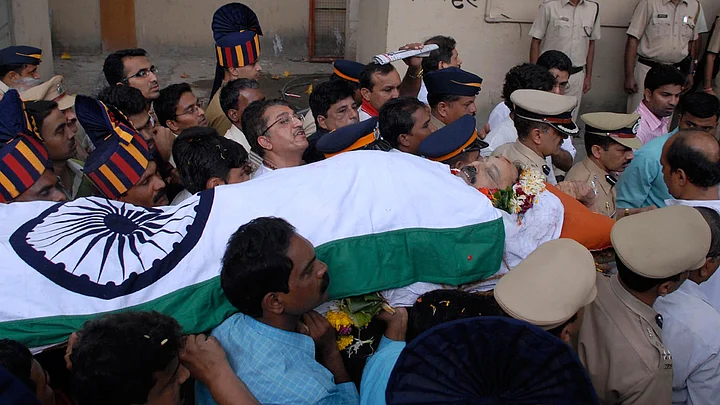The story of Hemant Karkare is the stuff of heroic legends. An engineering graduate from Nagpur, he joined the Indian Police Service in 1982. After a seven-year stint in Austria with RAW, he was made Joint Commissioner of Police in Mumbai and eventually, Chief of Anti Terrorist Squad. He was killed in action during the 2008 attacks, shot thrice in the chest by Ismail Khan. December 12, 2015 marks his 61st birth anniversary.
Unfortunately, heroic legends leave out the part that comes next. After the media frenzy dies down and the dust settles, after the Ashoka Chakra is awarded and public interest starts waning, there is still a distraught family that must survive after it has lost its primary breadwinner.
It is this distress that Kavita Karkare, Hemant Karkare’s wife and a Nagrik Shikshan Sanstha lecturer, records in a poem she read out at the book launch of To The Last Bullet – The Inspiring Story Of A Braveheart – Ashok Kamte.
The poem, originally in Marathi, is full of anger born out of grief and loss. She condemns in a very cutting manner the pettiness of a government that asks its officers to lay their lives down for the nation and repays them with callous neglect. Here is an excerpt:
The compensation for martyrs got talked about a hundred times,
and the accounts of leave encashment and Provident Fund were given
If that was not enough, there were reminders of the Rs 15000 that were given for the last rites.
Do not make the mistake of becoming a martyr while being in a government job.
Murders are forgiven in this country.
Those who have been released from prison after being charged with corruption
can mingle among the masses with their heads held high.
But when you become a martyr, you become a pariah.
Do not ever commit the crime of becoming a martyr in this country.
Should martyrs be hanged?
Or should their martyrdom be kept alive?
You will decide. You will be keeping a flame that torch that we have lit.
The financial realities of life are not poetic, but they need to be addressed and this Karkare does brilliantly. Her poem angrily combats it all – the stinginess of government compensation, particularly for low ranking officers’ families, the hypocrisy of medals, our legal system that makes a farce of justice.
Kavita Karkare fought the good fight – for better compensation policies, against corruption, against bureaucratic apathy – till the end, before a brain haemorrhage took her life in 2014.
(At The Quint, we question everything. Play an active role in shaping our journalism by becoming a member today.)
